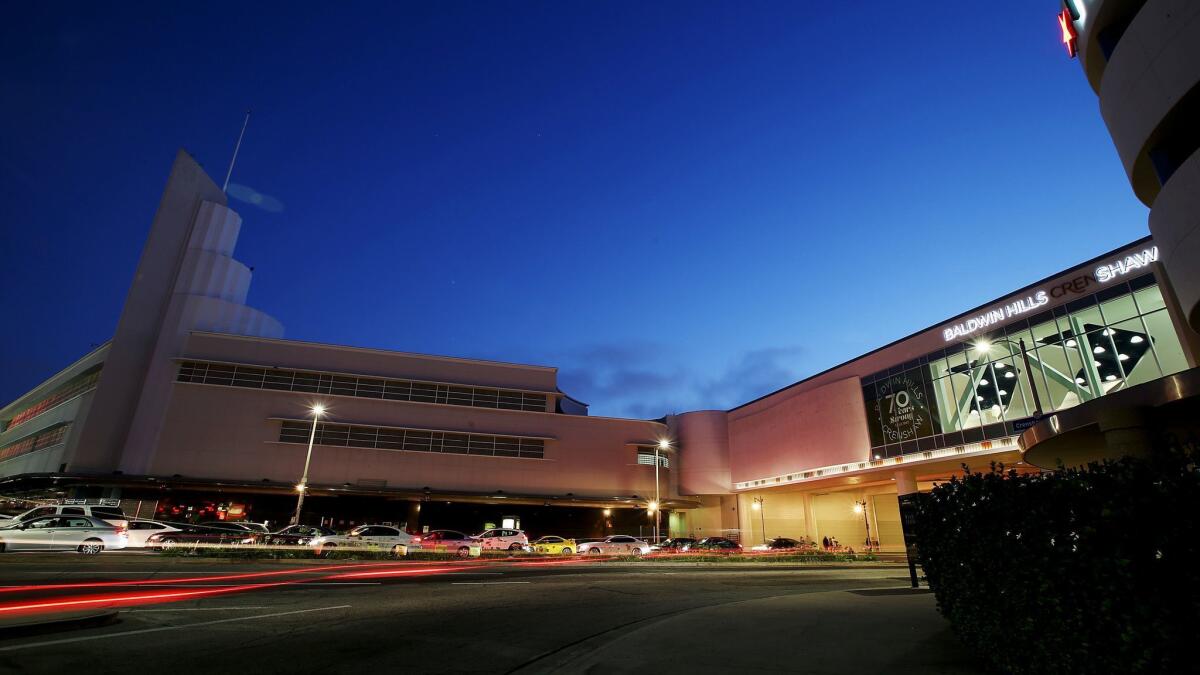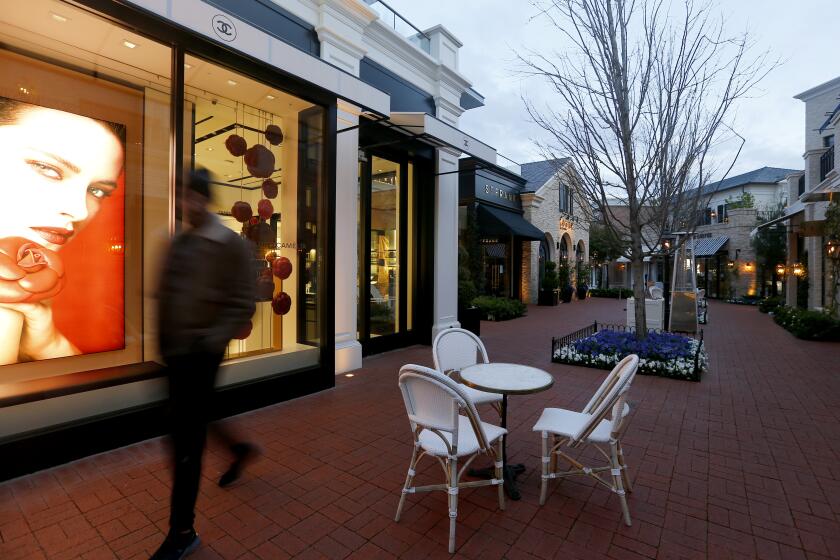Sale of Baldwin Hills Crenshaw Plaza may bring offices, not housing, to the mall

- Share via
One of the biggest malls in Los Angeles, Baldwin Hills Crenshaw Plaza, will be sold to a local developer that plans to remake the sprawling shopping center into a mixed-use complex that includes offices for rent.
CIM Group has agreed to pay more than $100 million for the 40-acre property at Crenshaw and Martin Luther King Jr. boulevards, co-founder Shaul Kuba said.
The 869,000-square-foot mall with a Cinemark movie theater has been mostly closed since March because of the COVID-19 pandemic, but the struggling center had previously lost anchors Walmart and Sears, which together occupied about a third of the mall’s total space. Its Macy’s department store and IHOP restaurant were not included in the sale.
The deal done at the dawn of an expected recession reflects both the declining fortunes of many conventional shopping centers and the potential for growth in an economically ascending part of the city. An underground light-rail stop is set to open next year at Crenshaw and Martin Luther King Jr. boulevards.
“There are very few large sites in the city that have a subway stop right in front,” Kuba said. “I think we have a tremendous opportunity.”
The coronavirus outbreak has closed malls and most stores. Disputes are brewing over rent. Retail may look quite different in the future, experts say.
The neighborhood known as Baldwin Hills/Crenshaw is densely populated and lies south of the historic West Adams district, which has seen an investment boom in recent years from residential and commercial developers in search of the next gentrification frontier as formerly inexpensive markets such as Culver City and Playa Vista grow pricier.
CIM Group is developing apartments and offices in West Adams, and Kuba sees Baldwin Hills/Crenshaw as ripe for more commercial development, especially offices that are near public transportation.
“The success of Culver City and migration of [office] tenants going east to find better rent structure is opening the door,” Kuba said.
Other prominent Los Angeles shopping centers, including the Sherman Oaks Galleria and the Westside Pavilion, have been or are being converted substantially to office use while retaining some shops and restaurants. Google has agreed to be the main office tenant in the former Westside Pavilion starting in 2022. The old Macy’s department store there is also being turned into offices for rent.
Kuba envisions converting the former Sears and Walmart buildings at Baldwin Hills Crenshaw Plaza to offices. It’s unclear how many of the mall’s smaller stores will reopen after the coronavirus-related business shutdown, but Kuba said he believes that office tenants would help support the mall’s shops and restaurants.
The mall site received city approvals in 2018 for an additional net 2 million square feet of new development including apartments, condominiums, a 400-room hotel, office space and additional stores.
Kuba, however, said he is not interested in building housing there, even though most of the space approved for new development is designated for multi-unit residential use.
“This has been, since the day it was built, a commercial hub,” Kuba said. “You really want to make sure you are going through the right planning steps before you give up commercially zoned land for residential.”
The leader of a group opposed to a previous owner‘s proposal to add nearly 1,000 residential units said he wanted to know more about CIM Group’s plans before taking a position on them.
“Right now, we are just talking to CIM about the new project,” said Damien Goodmon, executive director of the nonprofit Crenshaw Subway Coalition, which has expressed fears that market-rate housing at the mall could lead to gentrification that would displace longtime residents in the neighborhood.
“It’s a significant change from what the community has been talking about,” he said of CIM Group’s emphasis on adding offices. “We need to understand it better.”
City Councilman Marqueece Harris-Dawson, who represents the neighborhood and backed the 2018 proposal to expand the mall with housing, said in a statement that CIM’s announcement Wednesday “demonstrates an uninformed, ahistorical and premature analysis” that overlooks “hours of hearings, legal proceedings and other community involvement.”
He said he hopes that decisions about the mall’s future will again include citizens, stakeholders and elected representatives.
Baldwin Hills Crenshaw Plaza traces its roots to 1947 with the opening of Broadway and May Co. stores, complemented by shops and restaurants.
In the 1980s, Mayor Tom Bradley wanted to see a major shopping center in the neighborhood and encouraged linking the stores to create an indoor mall that was completed in 1988.
Capri Capital Advisors of Chicago bought the mall for $136 million in 2006 and spent more than $35 million on upgrades, including a makeover of the movie complex formerly operated by retired Lakers basketball star Magic Johnson.
The mall has been controlled since 2019 by a Chicago private equity fund of institutional investors called Capri Urban Investors, which is selling the property to CIM Group. Kuba said he did not know when the sale would be final.
CIM Group owns and develops commercial properties in multiple states and opened offices in Tokyo last year. It owns and operates assets valued at nearly $30 billion, according to its website. CIM bought the struggling Hollywood & Highland entertainment complex in Hollywood in 2004.
More to Read
Inside the business of entertainment
The Wide Shot brings you news, analysis and insights on everything from streaming wars to production — and what it all means for the future.
You may occasionally receive promotional content from the Los Angeles Times.












